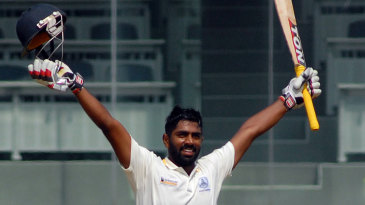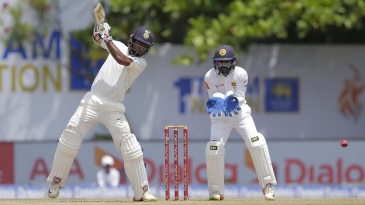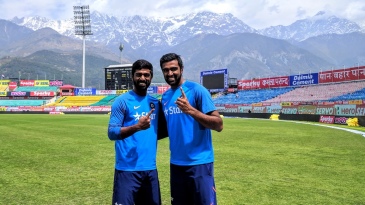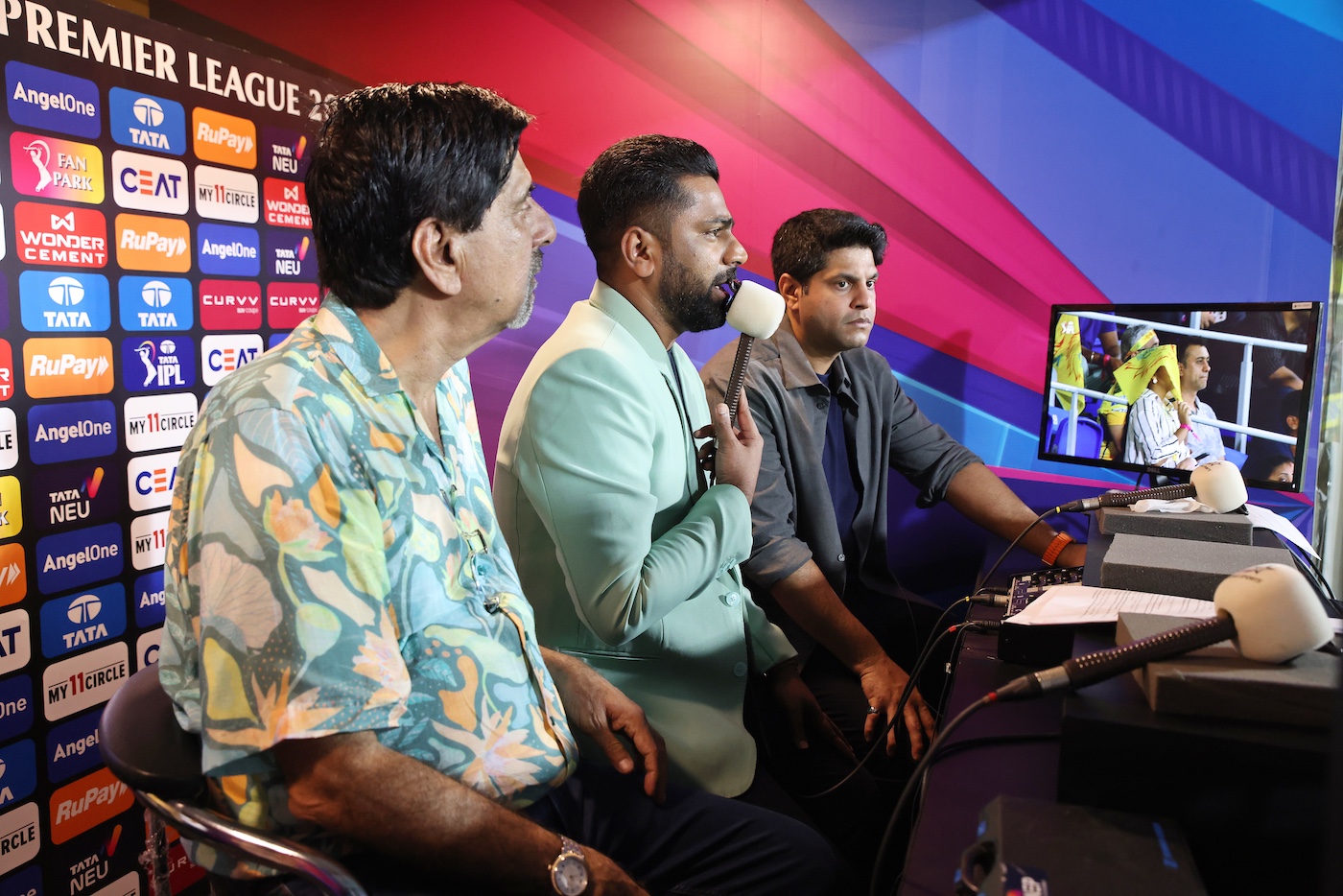


A domestic stalwart, briefly a Test player and now a sought-after broadcaster, Abhinav Mukund talks about the many twists in his career
In a career spanning 15 years, Abhinav Mukund earned a reputation as one of the most reliable batters on the domestic circuit, amassing over 10,000 runs in first-class cricket. Despite his prolific performances and leadership with India A, his opportunities at the international level were limited - he featured in a handful of Tests without an extended run to prove his mettle. In recent years, Abhinav has carved out a new niche for himself as a broadcaster and presenter with sharp insight into the game he loves. Talking here to a fellow commentator, Abhinav discusses his startling rise through the age-group ranks, his struggles at the highest level, and why he won't juggle two careers at this stage in his life.
I think it's always nice to know how somebody who played for India first fell in love with the game. Tell us about that.
Just like any other kid, I guess, in this country. My dad used to play a little bit of cricket. I used to watch him, I used to go to his club games. [He was] a very passionate man. Unlike me, who stopped playing at 30, he played on till 50.
My mom was an active cricketer. She played for her universities. My dad was my mother's coach at one point, and they fell in love and they got married. So genetically, I was wired to play this sport.
Your mom played cricket for university around the '80s?
Yes. My dad was actually a middle-order batter. My mother was the opening batter in the family.
They supported me really well. I think no one in India makes it big unless their parents support them. And what I mean by support is not financial support. You need to be there. You need to be hands-on, throwing balls. My dad used to throw a thousand balls a day at me. These are things that are mandatory for any parent to do, for your son to become a very big [cricketer].
Now that I'm a father, I don't know if I'll be able to throw a thousand balls a day. But if you look at stories around Indian cricket, and the influence the fathers have had, or a particular coach or a mentor or a guardian has had, that's very important for you to succeed in our country. And I believe my dad did his best to sort of ingrain in me the basics of cricket.
I want to talk a little bit about your dad, because TS Mukund is somebody who's got a story of his own worth telling. I know that he runs an academy in Chennai which supports underprivileged budding cricketers, and the WPL auction in 2024 brought to light a very noticeable success story for him.
My dad is a bit of a taskmaster. He's a bit of an old-school cricket coach. Nowadays, if you look at cricket coaching, it's about asking the right questions. It's not about telling or enforcing rules. My dad was a very strong believer in the discipline part of the game. He was very old-school that way, where he would say, even if it's 12 o'clock in the afternoon… He has his nets at 12 to 1.30pm in the peak summer of Chennai, and the man is now 68 years old. He still enjoys it with a passion. And now that we're comfortable enough and he's retired from his bank job, he does it purely for the passion. And he takes in kids who are able to sustain the kind of training that he [puts them] through.
 "No one in India makes it big unless their parents support them. You need to be hands-on, throwing balls. My dad used to throw a thousand balls a day at me"
"No one in India makes it big unless their parents support them. You need to be hands-on, throwing balls. My dad used to throw a thousand balls a day at me"

He doesn't pick kids at random. He just picks kids because he's passionate about developing the next generation of cricketers. That's it.
I enjoy what he does. I go to his academy whenever I'm in Chennai.
He loves putting the younger kids through the paces, be it a boy or a girl. He's got so many of these younger kids who come to him regularly. And I'm glad that he's giving back to the game so much.
And his life has been cricket right from when he was 18. He played club cricket. He was on the fringes of Tamil Nadu. Then he was actively into coaching, took a break in between just to support my career. And now he's back again. And I think he's really enjoying himself, which I'm very happy [about].
I think you need to be active at that age also. So kudos to him.
A number of cricketers talk about how, at a fairly early stage of their career, or when they were growing up, their dad said, "I want to make my son a cricketer." Was that the case for you?
I was very good when I was young. So it was a pretty easy choice for my dad. Because even when I was younger - [if] the club that I used to play for, St Bede's Foundation, didn't participate, other clubs would call me on as a guest player. So I think by the time I was 14 or 15 - and I'm not exaggerating - I would have got at least about 80 to 90 hundreds in school and club cricket. So it was a very simple path.
At one stage, I think my mother didn't approve. She said [to] pursue education, which has come in handy for me, possibly in the latter half of my life. But it was a no-brainer for me to actually pick up the sport, because I was really good.
When I was 13, I was picked for Under-15s. When I was 15, I was picked for U-17s. So on and so forth. When I was 16, I was playing U-22 cricket with much older boys. A lot of people just fall out in that 17-18 [age] region because you need to pick a career. And luckily for me, I think I got a Ranji call-up at the right time.
'I saw Brian Lara batting on TV, and I said, I won't bat like anybody else'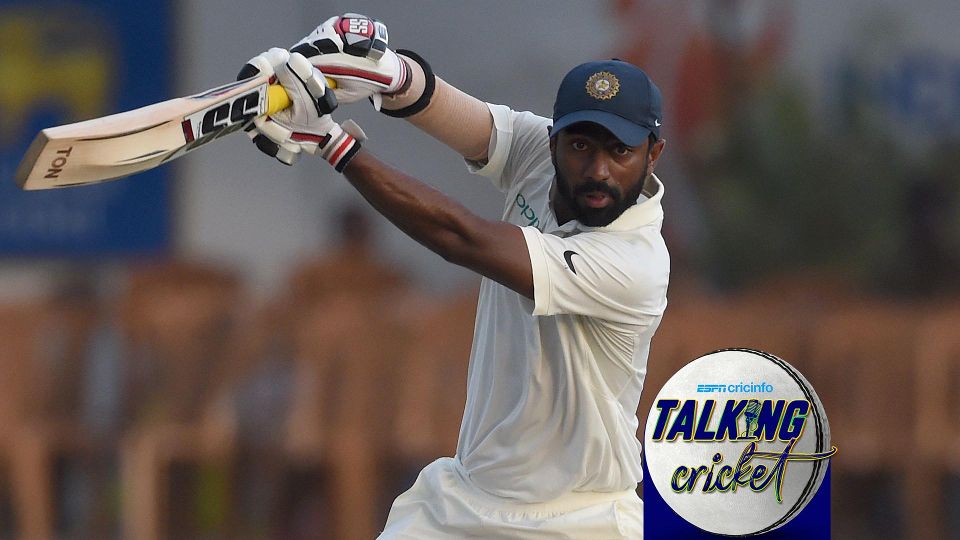
How did education come in handy later?
Because the interest in - just reading, the interest in developing language, understanding history… I think it's very important that you speak well. And I think for my broadcasting career, it really helped that I was able to get my thoughts in order. It's really important that you are educated till a certain point, because confidence is also a very important thing when you're in front of a camera. So that really came in handy.
I never thought I'll have a career in media.When I was 16-17, even when I was 28, I didn't even think I would get into commentary or media. It just happened. But I think all of that was [because of] the early years, because my parents pushed me to read a lot, which is why I have a decent command over the language.
I want to talk about who you looked up to before getting into the phase when you got lots and lots of runs. Do you remember the first role model or someone you saw and thought, "This is the guy I want to bat like"?
I was so adamant when I was about five or six years old. I'm a natural right-hander. But I saw Brian Lara batting on TV. And I said, "I won't bat like anybody else. I want to bat like him." My dad actually tried very hard to push me to the other [right-handed] side. But I looked at Brian Lara and I said, I have to bat [like him].
Was there a case of you playing a little bit right-handed, in gully cricket or in the...
Never. There are photos of me when I was about three, four, five years old, where I was batting left-handed. I think my dad just gave up after a point. I think it coincided with Brian Lara playing in India, playing in the [1996] World Cup. I was just such a huge fan of Lara growing up. My dad used to watch those early-morning or late-night telecasts of him playing those innings, and it just stuck with me that, okay, this is the man I want to bat like.
 "I was always very good at Tamil Nadu level, South Zone level. But when I went to the NCA, I always came back and thought, 'Okay, this is where I need to improve my game'"
"I was always very good at Tamil Nadu level, South Zone level. But when I went to the NCA, I always came back and thought, 'Okay, this is where I need to improve my game'"

As you were making these hundreds at age-group-level cricket, I'm sure at that point, you start feeling like, yeah, I'm meant for something special. Did that sort of feeling come in at that point?
It would come in spurts, because I would like to think I was always the best player in my state side. But then the BCCI introduced something called the NCA [National Cricket Academy]. And when you go to the NCA, there's a reality check, because guys from around the country come, and you're thinking, "My god, this guy!"
The first time [I was at the] NCA - and bless the man, he's passed away - the late Parthasarathy Sharma, he was our batting coach. So I'm 14, got a truckload of runs, I go to the NCA. And they did something called video analysis, right? And in my head, I'm thinking, I'm Lara, I'm Lara. First thing he [Parthasarathy] tells me - I don't think you'll survive in men's cricket, because you bat like [Shivnarine] Chanderpaul.
It's not really an insult.
It's not really, but just imagine, no offence to Chanderpaul, because the way in which he accumulates his runs and whatnot… but in my head, I'm thinking, I'm Brian Lara and he says, you're batting like Chanderpaul.
So there are about 45-50 kids who come in from all around the country, and some lose their way in the next stage. I was a regular at these NCA camps, but it was always a reality check of where I stood in terms of the India call-up or Indian junior team selections, because you always looked at your competition and thought, "Man, this guy is good." And it's rubbed into a lot of these guys who've gone on to become legends today.
So I was always very good at Tamil Nadu level, South Zone level. But when I went [to the NCA], I always came back and thought, "Okay, this is where I need to improve my game."
'I thought I was Lara, my batting coach said I was Chanderpaul'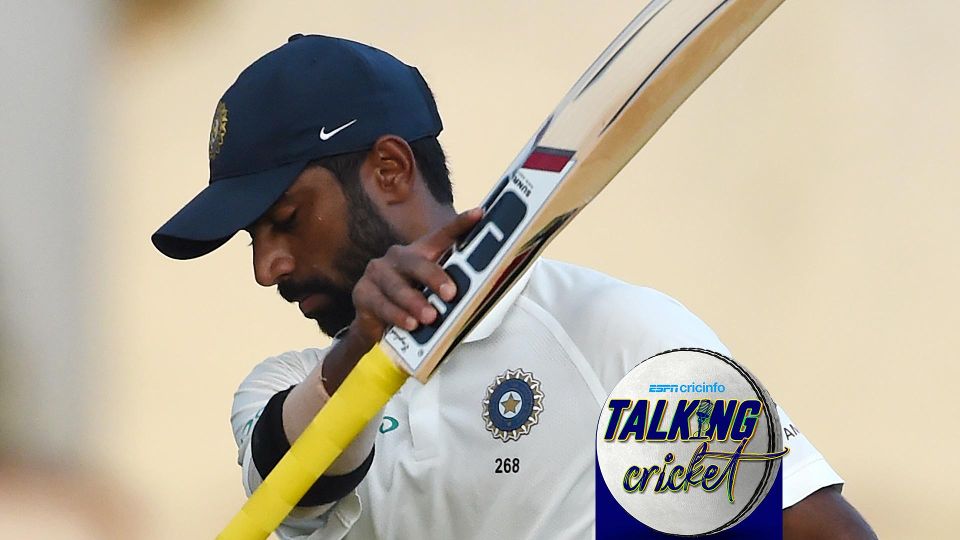
I'm going to soon come to your Under-19 days. But before that, since you mentioned these other boys who came to that academy, anyone in particular that you'd like to tell us about? Or do you remember anyone who made it ahead in that first group?
Lots of guys actually made it. From the South, Manish Pandey was a regular feature from [age] 16 onwards. He played in almost all of the camps. There's another guy who possibly fell out from Tamil Nadu - I don't know where he is now - but Napoleon Einstein was very good at that age. Over and above that, you'd have these spinners who'd pick up an insane number of wickets - 70 wickets, 80 wickets. But one guy who actually stood out for me even in those younger-day camps was Bhuvneshwar Kumar.
We were both the same age. And he was a very quiet, unassuming guy, because generally - and I don't mean to stereotype here, but the usually loud ones come from Uttar Pradesh. And you'd find all of these guys being the life of the camp, right? Bhuvi was a very reserved kind of guy. But man, he used to make the ball talk. And that stood out for me, even at a very young age. [He was] never a big guy for a fast bowler, so you'd probably underestimate him a little bit. But he was really good, even at that age.
Who else? [Ravindra] Jadeja stood out from day one. Just a naturally gifted athlete. Everybody else had to work hard. I'm not saying Jadeja didn't work hard, but Jadeja was naturally gifted. He had that gun arm when he was 17.
So these guys stood out. But a lot of these guys actually fell out of national reckoning soon after, because it's a very tough country to actually make the progression to your first-class sides. Because you're fighting against adults suddenly. The transition is the hardest in our country. And that's where a lot of cricketers lose out. Thankfully, there's the IPL today.
The friendships that you forged at that time, were there any at that particular stage when you started mingling with players from other parts of the country? We hear so many times that language can be a barrier, cultures can be a barrier. Did you gel instantly with other players the minute you moved from state to national?
Yeah, funnily enough. Our first Under-19 tour, for the ODI leg, I was [room-mates] with Jadeja. And he used to bring all of these Gujarati snacks, which I hadn't heard of then. Because obviously, you don't travel that much to that part of the world. And you don't know what cultures they come with. He had an entire suitcase full of Gujarati snacks.
 "Jadeja stood out from day one. Everybody else had to work hard. I'm not saying Jadeja didn't work hard but he was naturally gifted. He had that gun arm when he was 17"
"Jadeja stood out from day one. Everybody else had to work hard. I'm not saying Jadeja didn't work hard but he was naturally gifted. He had that gun arm when he was 17"

Jadeja, at least we used to talk in my broken Hindi, his broken English, we were still okay. My next room-mate was a bit of a challenge, Pradeep Sangwan. Till date, we remain good friends. Sangwan was from Delhi, [but] is actually from Najafgarh. And he and I became really good friends. I don't know why, because we spoke little. But it was a character off the field.
So was that your first initiation into picking up Hindi?
Yeah, I realised that I need to speak Hindi to survive in this dressing room. Because the higher you play, if you have an Indian coach, you're going to have your team meetings in Hindi. And you really need to understand or speak the language for you to be a part of the dressing room.
That's why India is such a beautiful country, because you have varied cultures but everyone comes together. The only disadvantage, especially for a Tamilian cricketer is, you need to learn Hindi. I think all of these guys now speak the language really well. All the younger boys have picked it up beautifully.
Coming to the 2008 Under-19 World Cup, it turned out to be as defining a World Cup because of how the 17 years that followed went. Take me through how it was before the explosion, before the IPL, when an India side led by Virat Kohli that you were part of won the [Under-19] World Cup. What was the experience of playing with these guys, when you reflect upon it now?
I'm not a big believer in destiny or fate, but what actually transpired two or three months before… Tanmay Srivastava had led India for two years till December of 2007. By chance, Virat scored tons of runs [in domestic cricket], and captaincy was handed to Virat just one series before the World Cup. And we did well in that series.
And Virat went as captain [at the World Cup] and Tanmay was one of our prolific players - he'd been a part of the set-up for a while.
'Winning the U-19 World Cup is the fastest way to scale a grade in Indian cricket'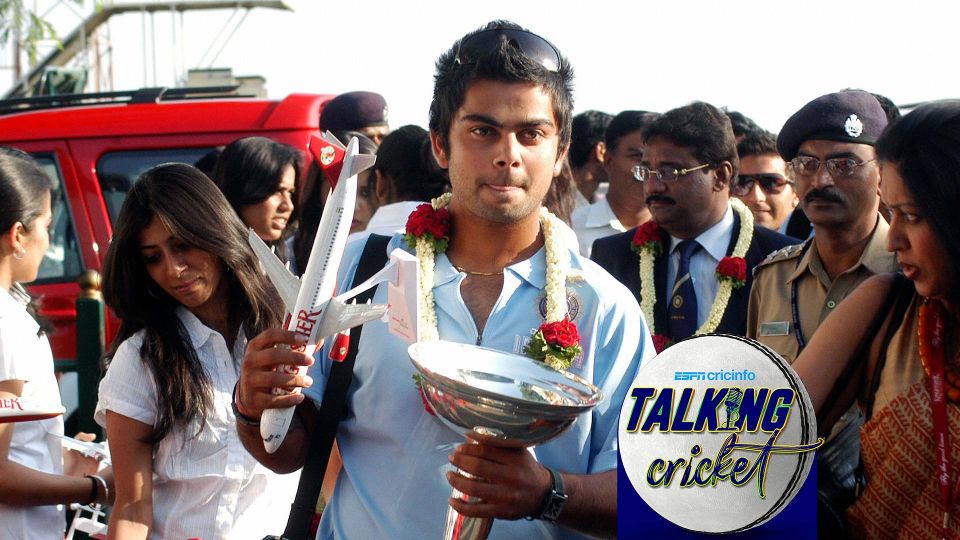
I don't know. I keep saying I don't believe in it. But if you look at the [Under-19 World Cup final] scorecard, you'd be like, what are you even saying? Because we got 150 [159] in 50. And they needed 130 or 125 in 20 overs [113 in 25]. They got very close.
But we were meant to win. And it was ironic because as soon as the game got over, it rained. It was also the time when India had won the CB series. We were transported back by one of the Kingfisher Airline flights, private, chartered. We had an open-top bus parade.
This was just about a year after the inaugural T20 World Cup.
Right. So we were all awarded. Every journalist would come and ask - we'd got 20 lakhs as prize money - "What are you going to do with the 20 lakhs?" And everyone's saying, I'm buying a car. I'm buying a house. But you don't know what's in store for you in the future, right?
Personally, I was a bit deflated because I didn't play [a game in] the entire World Cup. I was waiting for my opportunity. Waiting, waiting. But the guys that opened were really good. And my one-day game wasn't as good at that point of time. So I was very happy to sit out, be a part of that World Cup-winning side.
But coming back, the reception that we got was exceptional. And when you win a World Cup - and trust me, whoever is going and playing the next World Cup, it's the fastest and easiest way to scale the grade in Indian cricket. Otherwise, you have to go back to the grind.
I know of my team-mates and friends who got into the South Zone squads immediately or India A squads directly. Virat played for India in less than a year. But then he was Virat.
The other boys, take Jadeja or Sangwan or Manish Pandey, Saurabh Tiwary, they got call-ups into their South Zone squads, Central Zone squads. They immediately got into the higher grade of cricket, because that's what people think: okay, this boy has won a World Cup, he's really good, let's fast-track him. And you see that till date.
 "When you win an Under-19 World Cup, it's the fastest and easiest way to scale the grade in Indian cricket. Otherwise, you have to go back to the grind"
"When you win an Under-19 World Cup, it's the fastest and easiest way to scale the grade in Indian cricket. Otherwise, you have to go back to the grind"

Kuala Lumpur, where that World Cup final was held, was a unique sort of venue. Do you remember just how it felt being at not necessarily a cricket centre of the world?
And it was also very unique because we stayed at a resort with a mall. I think it's called Sunway or Sun City, Almost all the teams were staying in that hotel.
Like an Olympic village.
Correct. So, we actually became friends with the other country players who went on to represent their men's [side].
And there are some very good players in that World Cup outside of India as well.
Kane [Williamson] was there.
Tim Southee.
I know Tim from the U-19 days, actually. And then he came on to CSK and we were already familiar with each other. Steve Smith was there, but we didn't play Australia. But we did a couple of tours in South Africa. So, the other boys like [Wayne] Parnell and Reeza Hendricks and Rilee Rossouw all became really good friends. I think till date, Parny [Parnell] and Shreevats Goswami get along really well.
Who did you have as a room-mate?
It was actually [Napoleon] Einstein and me. But Manish ended up being third wheel. I don't know how. Shreevats and Manish were room-mates. [I guess] because Shreevats was always outside, Manish [was] in our room half the time. It was all in the same corridor, you see. So everyone was just talking to each other.
I'm glad everyone's doing well for themselves now. We're still in touch. We have a nice WhatsApp group that we keep in touch [on].
'Virat was ultra aggressive even in the Under-19 days'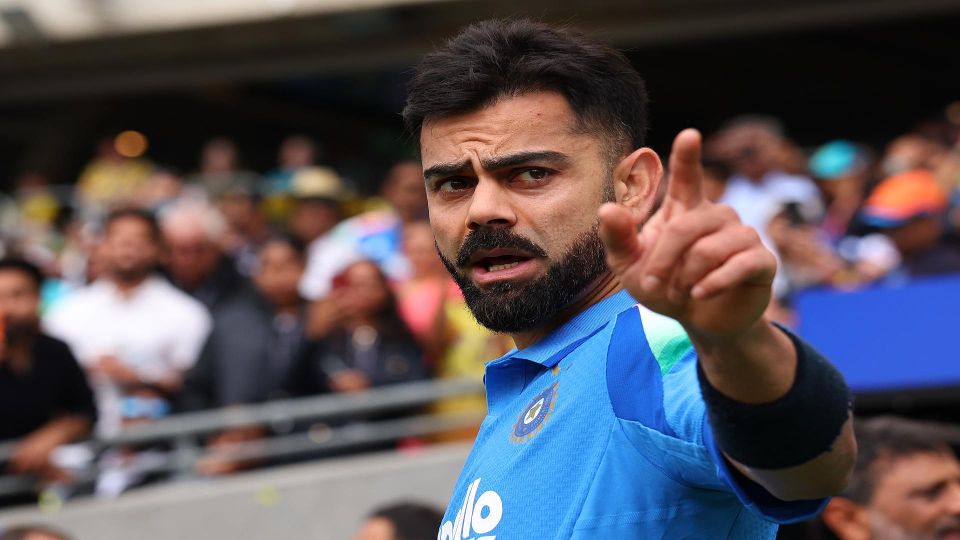
There is still an U-19 2008 WhatsApp group? And is your captain still part of it?
Captain [Kohli] was part of it. He used to be active [on the group] during Covid. I don't know if he's part of it still. But yeah, we keep in touch whenever someone achieves something. Like, two of the boys became umpires. Saurabh Tiwary became a member of JSCA [Jharkhand cricket association]. All of these events are sort of catalogued and you just congratulate them. Wishing happy birthday…
We all know how Virat Kohli's career went, but back then, was there an impression that he made as an U-19 captain? Or at that level, is it more the coach?
At that level, it's more the coach. A little bit of the coach. But Virat was always very instinctive and aggressive. He was ultra-aggressive even back then. And he would go on to the field to win. Personally, I always [wondered]: will he be able to sustain this in international cricket? Because he was so wound up all the time. He was very aggressive. I always believed that he would play to win, and he would actually put on a game face.
And you felt that from a younger age itself. I always felt that he was meant for bigger things. He was so driven as a person and as a cricketer. And he would want to be the best at everything. Anything he does. Even drinking this coffee or something like that, right? He'd be like, "Okay, I drink this better than you." And that's the sort of person that he was.
How did you celebrate the World Cup win? Do you remember?
Yeah, we have this nice photo that keeps circulating. We all drank orange juice. We ended up partying till about three or four in the morning. We ended up drinking orange juice all night. That was enough, we were already buzzing and flying.
As you said, you didn't get to play in that tournament. So I'm sure you were itching to get runs. And the full force of that frustration was felt by the opposition in your next Ranji game. Because then came, I think, the epic 462-run stand with M Vijay. Right after the World Cup, wasn't it?
Yeah. So March of 2008 was the World Cup and this was in October-November 2008. I'd already played a season of Ranji. But like I said, that 20 lakhs, first thing that I did was not buy a car, not buy a house, the first thing I did was go and give a cheque to [strength and conditioning coach] Mr Basu. Because I told him, the other boys, especially from the northern part of the country, are way stronger than I am. I'm not able to compete with them because I'm not powerful. Make me stronger. Tell me what I need to do to become stronger.
 "Virat would want to be the best at everything. Anything he does. Even drinking this coffee or something like that. He'd be like, 'Okay, I drink this better than you'"
"Virat would want to be the best at everything. Anything he does. Even drinking this coffee or something like that. He'd be like, 'Okay, I drink this better than you'"

This is Shankar Basu.
Shankar Basu. And I trained solid for about two months, three months. Felt good, played club cricket, got lots of runs. And by the time I hit the Ranji season, I knew exactly. And it was also a culmination of other guys coming in who were also keen to get into the Indian side. Like Badri [S Badrinath] was on the fringes. DK [Dinesh Karthik] was making a comeback, or he was trying to make a comeback because he was dropped after a couple of bad series. Murali Vijay was also in the reckoning. So there were so many guys who wanted to be a part of the Indian side - that actually drove a lot of our younger boys.
So it just happened that Vijay and I started batting in Nasik. Batting, batting, batting, went on batting. And I was 250-odd at lunch on day two. And Raman [WV Raman, Tamil Nadu coach] and DK came to me and said, we'll give you an hour to get to your 300. Got in 45 minutes and just walked off nicely.
One of my most memorable innings. But again, I owe it a lot to the fitness and the four months of hectic preparation I did before that season.
So at that point, when you say you came back from the U-19 World Cup, would I be accurate in saying that you were very self-critical at that time?
It was the upbringing also, right? And it was also the disappointment of not playing the World Cup. My parents refused to allow me to splurge on anything big. It was almost as if most of the people from my part of the country were raised like that. But it also hurt me somewhere that I wasn't as strong as these boys [from the north]. I wanted to make a solid change because I needed to compete. I had to go back to the grind of first-class cricket. There was no fast track for me.
So that way, I felt me joining a gym… because you had your gyms or you had your trainers [when you were in] teams, right? But there was no concept of a personal trainer back then. So I just hired one and that actually reflected in my game for the next two or three years.
This was a decision you came to yourself? It wasn't your dad or your coach at home saying, you know what, these guys have more power, so let's do this for you?
I remember Basu telling me at that point, at 17, go bring your mother or father. Are you allowed to spend this money? He was like, "What are you doing?" It was expensive at that time. He was training South Indian Tamil film celebrities at that point. So he was like, "Are you sure you want to spend this money on me?" I said, "I'm very sure."
Abhinav Mukund (standing, second from right) was part of the 2008 U-19 squad that won the World Cup, though he didn't play a game
© Getty Images
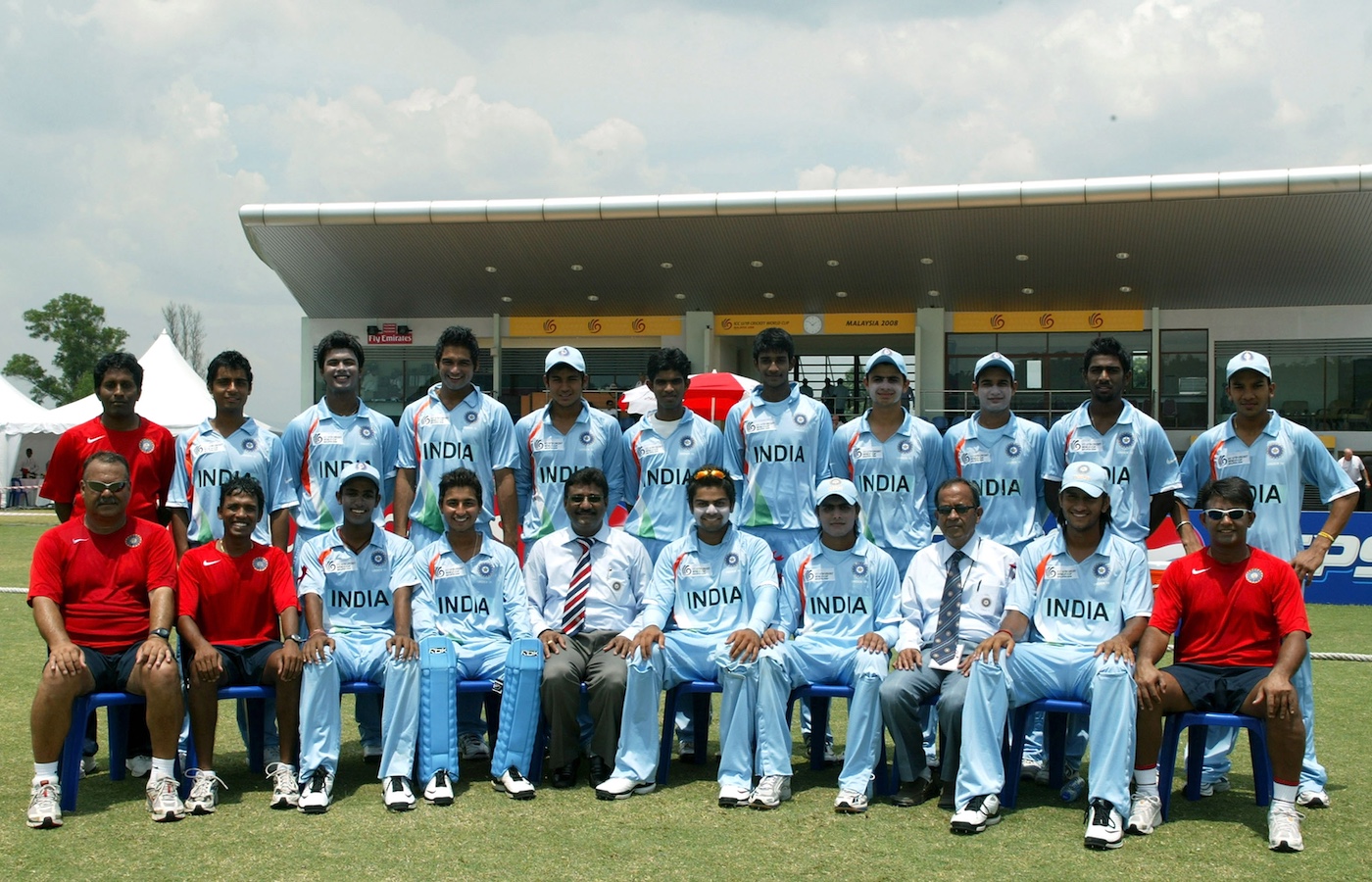
It was clearly an investment, because about two and a half years later or so came the dream.
And it didn't come easy, it [came] after tons and tons and tons of runs in Ranji cricket. And it just came because those years that preceded it, every year I would get two hundreds or three hundreds and it was just three years of consistent runs. I was averaging about 50 in first-class cricket and it was a natural progression. [Gautam] Gambhir and [Virender] Sehwag were given a break after that, and I was the first choice because I had already toured [with] India A.
How did the message come that you're going to be playing a Test for India?
I knew on the flight because the ODI and T20I team were already there in the Caribbean. So [on] my first flight, it was me, [VVS] Laxman, [Rahul] Dravid, [MS] Dhoni, [Pragyan] Ojha. Imagine that.
Economy?
No, of course not. Business-class flights, just five of us. We missed the [connection]. I think, from London you had to make a Heathrow to Gatwick transfer. We ended up going to Kingston, Jamaica just two days before the first Test. Rahul bhai and Lachchi [Laxman] bhai were in their own zone of "Oh, we know how to do this." Lachchi bhai, I remember, didn't even bat because the nets were so bad. I'm thinking, man, Dukes ball, I don't even know how Jamaica is gonna play, and massive jet lag as well.
So I was very nervous, but looking back at it, that's one of my regrets. I wish we had time to prepare for that tour.
You had two more debutants with you, rather two more players who were called up for the first time.
Correct. Virat and Praveen Kumar, but they were already there. And the good part for me was, that was the one guy who I knew well enough before all these stalwarts in the dressing room. The first person I went to was Virat. Like, "Kya chal raha hai, bhai. What's happening?"
There was the comfort of seeing him and just asking him what's happening. Also the comfort of Murali Vijay being there at that point. He was my opening partner for the tour. I'd played with him a lot. So I actually called upon these resources and asked them [about] the conditions. How are things playing? How's their team looking? You've been to the West Indies, you've been playing here for the last month, tell me how it is, and stuff like that.
 "On my first flight, it was me, VVS Laxman, Rahul Dravid, MS Dhoni, Pragyan Ojha. Imagine that"
"On my first flight, it was me, VVS Laxman, Rahul Dravid, MS Dhoni, Pragyan Ojha. Imagine that"

You were already playing a lot of first-class cricket by the time that call-up came, but even then that was a star-studded Indian team. Do you recall how you felt when you first shared space with them in the same team? There would have been interactions with them before that, I'm sure, but was it intimidating? Was it awe-inspiring?
It was a little bit intimidating, but I guess just like any other team, when you start mingling with them, you sort of look at them as human beings again, because everyone's in their own zone to prepare, everyone's trying to be the best version of themselves. And that's where I felt: the more you look at these guys, the more humanised they become. Where you look at them from afar, you're always thinking, "My god, they are your heroes and role models."
But - I mean this in a very positive way - they have their insecurities too, they have their fights, their battles, they wage it within themselves. The reason why they're so good is, they're able to get past all of that and become the legends that they are, and I enjoyed playing in that team for whatever it's worth.
Your international career had many ups and downs. You were getting runs but still not being picked. There were multiple openers who came in and once they established themselves, there was very little you could do to get a place ahead of them. At one point you were not picked for the IPL as well, which I'm sure you had your hopes up for.
Even when I was dropped in 2011, my numbers before that were… a hundred in a warm-up game in England. After the two Tests there was a tour game, I got a hundred against Northants, I got a hundred in an Irani Trophy game right after we came back - Rest of India against Mumbai, I think - and then my first Ranji game [after that] was a double-hundred.
And then the selection happened [for the home West Indies series]. I wasn't selected, so I was very disappointed. And two games later I got another double-hundred. I was hoping I'd go to Australia. [It was like] no matter how many runs you get, people are telling me, oh you're not good for overseas conditions, you're not good for a ball that bounces, swings, this, that.
Then I'm like, okay, maybe I need to change my technique, so the overthinker in me starts [kicking in] and I try to break my game down, change it, change my technique, change my initial movement, although I was still getting runs. But looking back at it, the only thing I would like to tell the 21-year-old version of myself is that I should have trusted my game a lot more, just continued to score those runs.
In his debut series, Abhinav Mukund was paired with his Ranji opening partner M Vijay, and scored his first Test fifty in his third game, against West Indies
© AFP
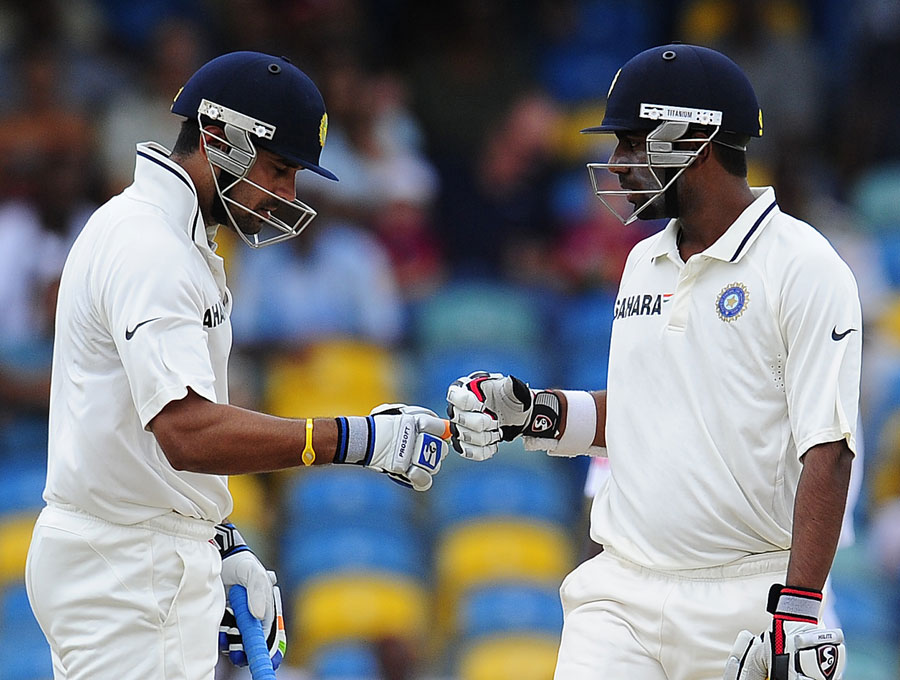
This is something we see even in 2025. Players who are prolific run-scorers keep hearing, "Oh you have this game, you'll get runs here, you won't get runs over there." We tend to think, okay that's fair, that's the judgment of the people that make selection calls, but on the other side of it, that is a shattering verdict that crushes somebody's dreams or brings in self-doubt, where you suddenly have to change your game, which has worked for you. So it's a more severe blow personally, isn't it?
It is. First, you try and adjust yourself mentally, because somehow, with whatever technique you have, you're scoring runs consistently, [but] it makes you doubt your technique. When doubt creeps into batting… [Cricket is] a reactionary sport. [When] you're reacting to the ball beautifully, you're scoring runs, but when you're thinking, you're not reacting. You shouldn't be thinking, you should just play the ball, but what happens is, [you think] "Oh is my leg moving in the right direction? Is my head in position? Are my hands in the right place? Am I actually getting to the pitch of the ball? Am I leaving the right ball?" You don't think when you're getting runs, ask any cricketer, they [just] do it.
But when you start thinking about it, when you're making adjustments to it in the middle of a season, thinking, "Oh my god, Stuart Broad got me out like this, okay let me try and play like how I shouldn't have got out," and then you're struggling against your domestic bowlers who you've been scoring consistently so much [against]. So all of these thoughts, all of these doubts creep in, you start losing your love for the game because you're not playing the way you're supposed to. What worked for me after that was, I went back to whatever I was doing.
I'm going to quote from an interview with ESPNcricinfo in 2016, where you said "Till I played for the country, I wanted to play for the country, but I never played for that. I always played to perform. I always played to win each game and do well for my team in each game. My expectations changed of myself and there was a 2012-13 season that was a complete blur."
What a profound young man (laughs). I really struggled during those years. I genuinely struggled, and if I didn't have the support of my parents, I would have really struggled [even more].
How would you have liked that phase to have played out differently?
I wish someone would have put an arm around me and said, "Take a break, go somewhere, do something different and come back. Just go and enjoy your game, don't worry about selection." I had a few very good friends in Tamil Nadu who were there, but they were all similar age groups and still fellow cricketers.
 "Cricket is a reactionary sport. When you're reacting to the ball beautifully, you're scoring runs, but when you're thinking, you're not reacting"
"Cricket is a reactionary sport. When you're reacting to the ball beautifully, you're scoring runs, but when you're thinking, you're not reacting"

But what I really genuinely lacked was someone telling me, "Don't try all of these things, don't go back to the drawing board unnecessarily, you're batting well." And that's the thing about coming from a very cricket-passionate state like Tamil Nadu. Anywhere on the street, anyone, will have an opinion on your game. "Why are you playing across?" "Why are you going outside off stump?" And they will have a solid opinion. "Oh, in that Test, you should have actually left the ball." And it will all get to you at some point.
And the best thing that happened to me was, I went away to England and I didn't do anything great there. I just went and stayed there for four or five months, played club cricket. The Indian team was there at that point. So I was thinking, wow, three years before I was playing at Lord's, how [low] have I come in life? So [that was] the bottom-most pit that I could get into.
But that changed me, I guess, [in the sense of] okay, I have nothing to lose after this.
You also took some time off. I believe you learned a new language. Tried surfing.
Yeah, I enjoy surfing. I actually enjoy the water. Till date, wherever I go, I try to get a beach holiday. My wife likes the mountains.
I did do all of that to sort of get away from the game. And I was criticised for it. Because, like I said, in Tamil Nadu [it's]: instead of going back to the gym or going back to the nets, why is this guy doing this?
That was so important for me, because I was just burnt out. That is something that I would actually ask anyone who feels that way [to do], because you are trying so hard, every day of the year. And suddenly, when you don't get things right, you try even harder and you make mistakes.
I find that to be a very unfortunate byproduct of sport, that the need to care for your mental health is sometimes thought of as not having the temperament to play high-pressure sport. You'd love to be able to tell your coach, "I just need a break, you know, I'm feeling burnt out, it's getting to me." But your coach could have completely different interpretations of it - that this guy is not tough enough. Do you sense that that remains a concern with the sport?
Not anymore. It's gotten a lot better now. I genuinely hope it's changing for the better. Now you've even got technology to tell you how stressed or how burnt-out you are, it should be a lot easier.
Abhinav Mukund and Bhuvneshwar Kumar attended NCA camps together. "Bhuvi was a very reserved kind of guy. But man, he used to make the ball talk. And that stood out for me"
© BCCI
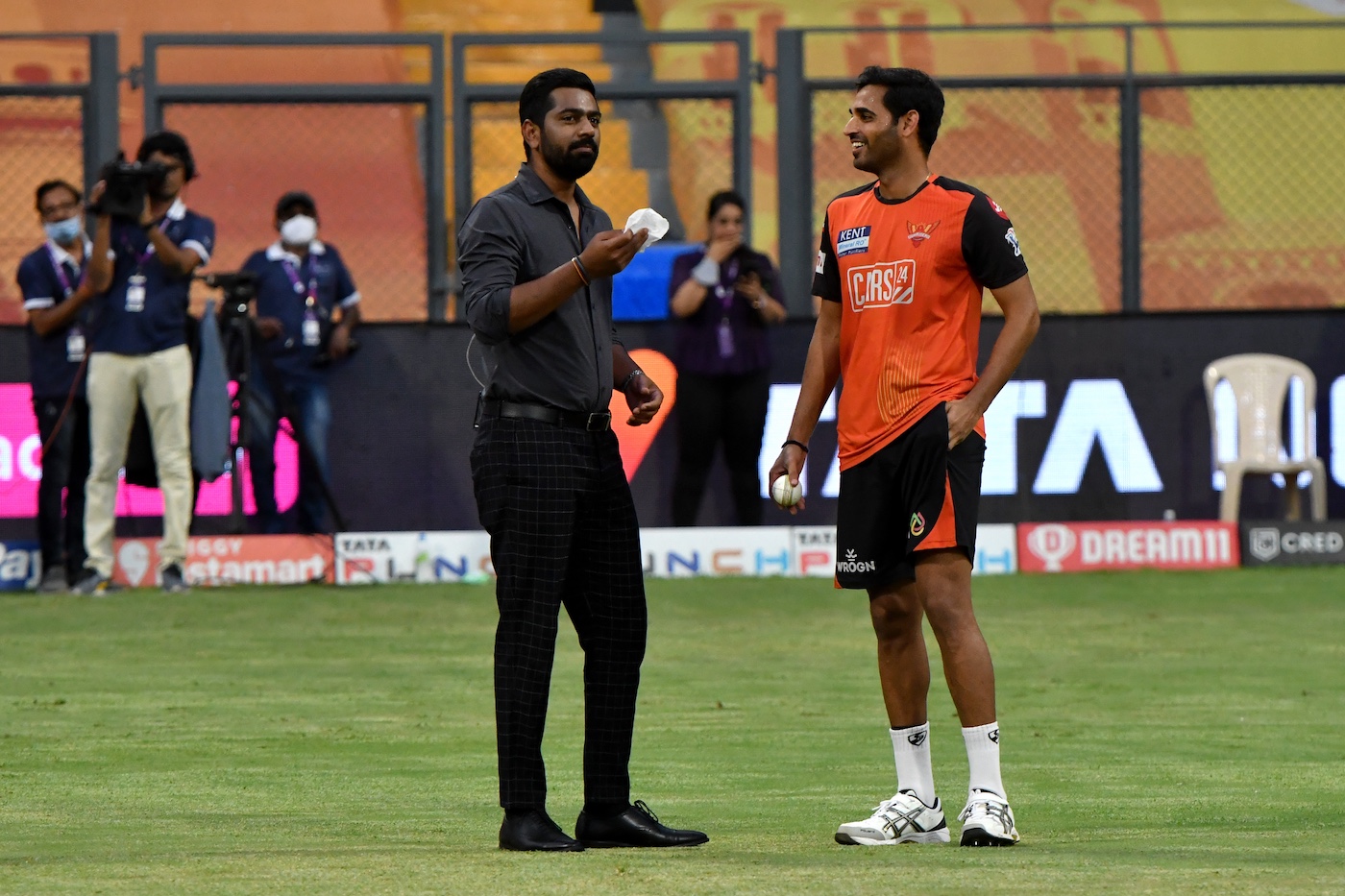
But if someone needs a break genuinely, they need a break, and we should be okay with it. I always bring this analogy for cricket: Say, you end up like in an exam. You study well, you work really hard, you'll get 90 or 95 marks out of 100. In cricket, [even] if you work really hard, you're not going to get a hundred. You might nick off first ball. The umpire might just give you out without DRS. So you're just out, sitting the whole day in the dressing room.
So I always believe that it's really important for players, if they feel they need to take a break, it's their call. Because they're all professionals, this is their job. They're not trying to get away from anything.
Who do you have to thank for coming out of that really dark phase when you felt like you couldn't go any lower? Who was it that really helped and how?
My parents really helped me. I went up to my dad and said, "I don't want to play the game anymore." He said, "Okay," which I didn't expect, because that was the conversation I was struggling to have. But I think over and above that, I have a friend in England who really helped me. I was staying with him at that point and he would just take me… [we] went and did an MMA [mixed martial arts] lesson, went and watched the F1, did random things, then came back.
I was asked to play the Buchi Babu [tournament] and luckily enough, I had a lot of friends, like Ash [R Ashwin] or DK or anyone who I could call at that point. I had Malolan [Rangarajan]. So all of these guys were very integral in just saying, "Okay, just do what you can, man, just chill out, enjoy your game."
So it was nice to have a good set of people around at that point of time. I know the people who were there with me during that phase, they're still there with me today.
Did the state help at that time? I think you spoke somewhere about how sometimes that can be a thing that goes against you, where when you've played for India, there are certain expectations from the state.
So I had a horrific season in 2012 and it actually happened after the year we went to the Ranji Trophy finals in 2011. In 2012, there were unnecessary changes in and around the set-up. There was a change in coaching staff. And then after that, I was dropped the next year for the one-day side of things. That is actually one of my biggest regrets: I felt I should have played ODI cricket for India. But let's get to that later.
 "I wish someone would have put an arm around me and said, 'Take a break, go somewhere, do something different and come back'"
"I wish someone would have put an arm around me and said, 'Take a break, go somewhere, do something different and come back'"

I never actually say this, but 2010-11 were our best years in List A cricket. We were unbeatable as a side, Tamil Nadu. We beat the best of opposition and we beat them comfortably. So right after that, 2013, I was dropped from the one-day side.
And then I was dropped [from everything]. I wasn't picked up in the IPL. Suddenly from January till August I had nothing to do. Imagine you're a full-time cricketer, seven months of the year you're jobless. What do you do?
I think things have changed a little bit now. I'm hoping it has. But at that point in time, I don't think state associations [were] very supportive of this. But after that, a lot has changed in terms of how they manage their players well.
When you were called back for Sri Lanka in 2017, you made a pretty good comeback.
Yeah, because again, 2016, I ended up scoring a lot of runs. I had a really good year in 2015. So it was just again a culmination of getting a lot of runs and getting back into the scheme of things.
I got 81 in the second innings and I think…
It's not a bad final innings to have. Do you look back at it now with contentment or is there the thought that life could have been fairer? Or is it, "Yeah, got what I got?"
No, I have absolutely zero regrets about my career. Like I said, the only regret I have is that I should have played ODI cricket for India, but that is again said in jest. But the whole journey for me, I genuinely believe with the talent that I had, I maximised my talent and I made the best out of it. So I was very happy.
Abhinav Mukund's 81 in what would be his final Test innings, against Sri Lanka in Galle, was also his highest Test score
© AFP

I was very content even when I retired. A lot of people ask me, "You're just 35. Why did you retire at 30?" In fact, someone… my biggest compliment came from Wasim Jaffer. He said, "I thought you're the only guy who's going to break my record of the most runs [in the Ranji Trophy]." He said, "You're very young and you've already got 10,000-plus. Just eight [thousand] more. You should have played." And I said, "No, Wasim, I am done." I just wanted a new challenge in life.
It's not like everything was over because there was a new experience coming up in your life in the form of the Tamil Nadu Premier League (TNPL).
True. TNPL was such a good thing to happen to Tamil Nadu cricket. And I believe that state-run leagues have their place in this day and age, because you have a lot more people watching on national television, you have guys who are playing under lights for the first time.
We won the inaugural year with the TUTI Patriots. There was DK, there was me, there was Bala [Lakshmipathy Balaji]. We picked really well in the draft system that was there at that point. Washington Sundar was part of the side, was a young man, 16 years old I think at that point. His first taste of the big stage and he'd just progressed into India U-19, then he came back to play for Tamil Nadu.
I enjoy the TNPL. I think it's a great tournament, it's been run really well. But at that stage, it was a great platform for all of us to go and express ourselves on national television.
And you enjoyed playing with DK. I think he was your captain?
I played a lot under his captaincy. I think our journeys also have evolved from way back in 2008, where he came in as captain and he had… it was a very captain-opening batter relationship, then it evolved into a much larger friendship, where we could discuss anything under the sun. And that's what happens when you're part of a team for a very long time. You could discuss your deepest, darkest secrets with certain players in the team, and I think DK was one of those. So it's a relationship that goes on well till this day.
 "In my 100th Ranji game, somehow I just thought, okay, what have I not done? I've never played with complete freedom. So I got a hundred in a session, from lunch to tea"
"In my 100th Ranji game, somehow I just thought, okay, what have I not done? I've never played with complete freedom. So I got a hundred in a session, from lunch to tea"

You did go back to finish off your first-class career, when the TNPL had also taken off and you finished with some incredible numbers - you had 86, 206, and a hundred for Tamil Nadu. I believe there's an interesting story surrounding your retirement.
Like I said, I've always believed in challenges, right? So there was a game which… we were almost going to be relegated and we were playing Railways at home, and it was a rank turner that they had made, and it was my 100th Ranji Trophy game.
There was a big felicitation and all of that. And somehow I just thought, okay, what have I not done? I've never played with complete freedom. So I got a hundred in a session, from lunch to tea, [with] reverse sweeps and scoops and everything. Hundred in a session, walk out, my entire family, wife, because it was my 100th game, my friends, everybody had come watching.
Then I went to Moti Bagh [Baroda], and I think it's one of my most memorable hundreds or double-hundreds till date. The team got about 340, 350, I think, maybe more [490 for 7 declared], but I got a double-hundred in 240 balls, if I remember, or very close to that. Till date it will rank as one of my top-five Ranji innings or top-five innings overall. Because, to get a double-hundred in Moti Bagh, people who've been around the circuit will understand - it is one of the toughest places to get even a hundred. And then I got 86 against Saurashtra, the champions.
And somehow it felt like I wasn't doing myself justice by just carrying on. I was able to get runs - and this is not me being cocky, this is me who knows how much I've struggled to get runs earlier - I was just getting runs for fun. I needed a challenge. And I didn't know where to go for it, because I'd played Ranji for 15 years.
Somehow commentary happened. And then I felt those nerves again, with those lights and the countdowns and calling the moments, and somehow it was more of a challenge. So I thought I'd pursue that.
On his relationship with R Ashwin: "We grew up in similar backgrounds. We went to similar academies, same sort of upbringing. And it makes you sort of an overthinker"
© Abhinav Mukund
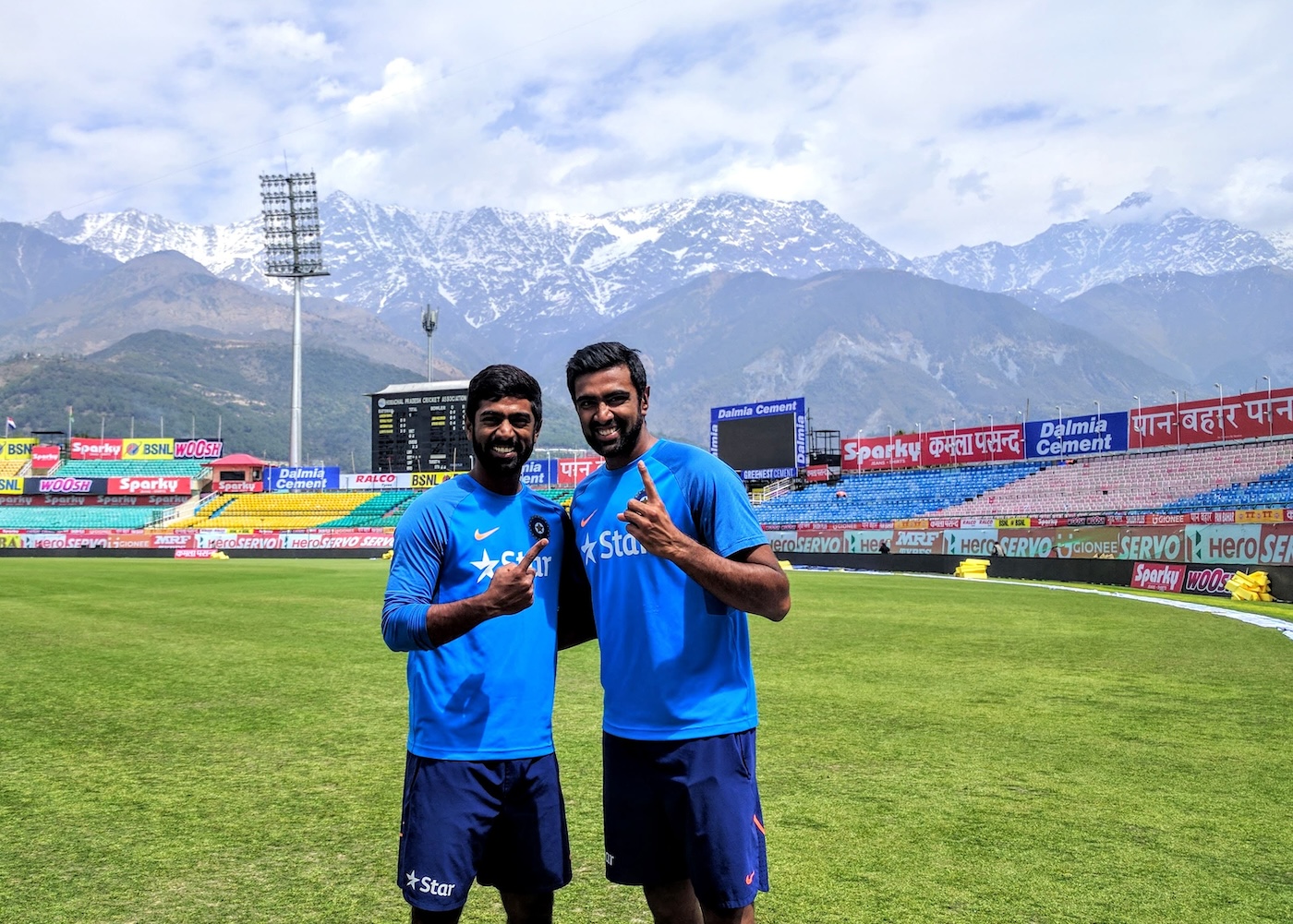
You said DK became one of your closest friends. What about R Ashwin? The three of you, your careers were kind of overlapping.
Yeah, Ashwin and I actually were in the same school, and he younger than DK, like a couple of years. So Ashwin and I go a long way back. I can't say Ashwin is my closest friend. But I will say this: Ashwin's career has hugely impacted mine, because the way in which he was driven to achieve things - and you need driven people in a dressing room to sort of get the entire team going - he genuinely inspired me as a senior player at that point and he was always there.
So the thing with Ashwin is, he's always reachable. Very, very rarely do you find those. I know he's always on social media and YouTube nowadays and he's reachable to everyone now, but back in the day, he was just a phone call away and it'd be a very normal [call].
We were never very close friends, but we were very close acquaintances. I can put it that way. Ash and I, we were room-mates [in the] initial part of our Ranji career.
Was he a fun room-mate?
I was always complaining about it, because I was an early sleeper. One of those good boys, early sleepers. Ashwin would watch… there's a channel, the sister network of Sun TV. They would play their movies at 8pm. My sleep time was 9.30. And he would watch that movie till 11.00. And the room would be really cold, and he would pull his blanket up and he would watch the movie loudly. I'd be like "Ash, please switch it off, please switch it off."
But yeah Ash, that was his routine. He would write all of these things down beforehand and he would be ready for the game. But he needs his night-time movie before. He's such a big movie buff.
When you made that earlier point about how you used to critically analyse yourself even at a young age, Ashwin spoke about that back in 2015-16, about how extreme his self-analysis and reflection was. If he wasn't happy or he felt he didn't do something right, he used to literally lock himself up in a room for days. Now of course the more mature and older Ash says he was really harsh on himself back then.
Yeah, I guess we grew up in similar backgrounds. We went to similar academies, same sort of upbringing. And it makes you sort of an overthinker, right? Like, I'm sure he would have experienced the same thing on a much larger scale than I did, perhaps, because everyone around him would have been like, "Why are you tossing the ball up? Why are you bowling so many carrom balls?"
 "I was always very clear about one thing - I was very clear that I don't want to keep my feet in two places. I've not gotten into coaching because I've given my entire commitment to broadcasting"
"I was always very clear about one thing - I was very clear that I don't want to keep my feet in two places. I've not gotten into coaching because I've given my entire commitment to broadcasting"

And that would have also impacted him in a big way. I'm sure if I talk to him now that he's retired from all formats… I should have a conversation with him about his younger days. But this was a very strong cultural thing that Tamil Nadu is actually very proud of, to be honest.
The challenges for someone who was by and large a purely red-ball player must have been so much more severe at that time for you, including around and after the pandemic, as a domestic player.
True. And the financial implications of it [were] also another reason why I was pushed into broadcasting. Because the IPL began first [post-pandemic], and then there was the domestic season after that, which was the next year; one year it didn't happen. But again, for a person who doesn't play in the IPL, what are your go-tos? You could get into coaching, you could do something else, but [there were] not many opportunities.
[I was] lucky to be handed that call-up at that point for Tamil commentary, but it so happened that I was made to think about the financial implications of it a lot more, because by that time I was married and I had a very young son. You're pushed to do something out of the ordinary.
But I was always very clear about one thing - that I don't want to keep my feet in two places. Till date, I follow that rule very well. I've not gotten into coaching because I've given my entire commitment to broadcasting.
At that time also, I felt if I did end up broadcasting - which I actually did for a couple of years, just for the IPL - then I would come back, I would train and I would get back into the Ranji scheme of things.
But I realised I wasn't doing justice to either field. So I said, "Okay, [I'm done]". A lot of my team-mates didn't believe me. I remember telling [Narayan] Jagadeesan in that Baroda game, "I think I'm done." He's like, "You're joking, you just got a double-hundred." I said, "No, no, I feel I'm done." I told Jaggi or Sai Kishore, one of these guys and they were shocked.
And I felt it. I genuinely felt I was done. And I needed a new challenge in life and felt this was the right time to take the plunge. So I made a few drastic decisions again in life.
Including coming to Bombay?
Yeah, I moved to Mumbai. And never in my life did I think I'd live in this city. It's been, what, four years now? And I'm enjoying every minute of it and the opportunities keep getting more and more every year, touch wood. And I would think that it's only going to get bigger and better from here.
Abhinav Mukund marked his 100th Ranji Trophy game, against Railways in 2020, with his 30th first-class hundred
© K Sivaraman
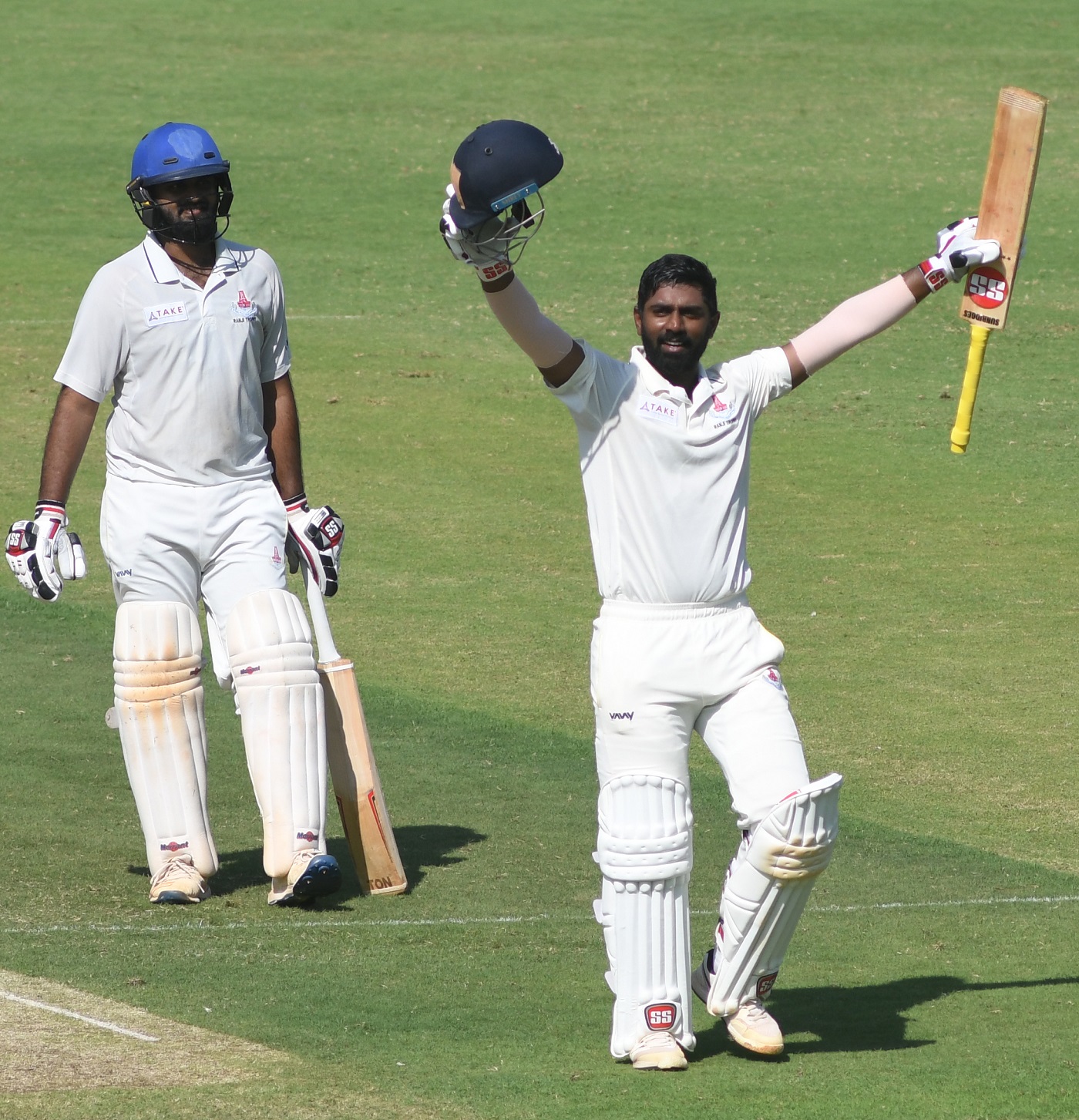
Let's talk about your broadcast career. In broadcast, nobody tells you if you're good or even if you're bad. Your only feedback is if you get called back enough.
So I think one of my first broadcast stints as a presenter, I went back for feedback and a very wise person [Raunak Kapoor] in the same building told me if there is no feedback, that means you've done well (laughs). I realised that pretty soon.
I enjoy the analytical side of the game, I've enjoyed my stints on ESPNcricinfo with you. The common theme to all this is, I don't enjoy other sports too much. I love cricket too much. And that's why I want to be involved around cricket.
So my daily routine is to watch any sport, like any game of cricket somewhere. And to be involved in cricket is such a big blessing for me. That's why I [never] take my job for granted. It's very hard to actually be a broadcaster in this day and age.
At least I've had the luxury of playing the sport at the highest level. For someone like you, who's involved with the game on a day-to-day basis, you know how hard it is to actually take notes and be in touch with the game, with whatever's happening. I'm glad AI has come in and I'm glad all of these data companies are helping us.
But all of this is just helping me be a part of the sport that I love. And that's what I truly enjoy.
I think that's the mutual connection between you and I. Because you enjoy the game as much as I do. And I've always gotten along well in this field with guys who actually enjoy the game a lot more rather than come here because of other reasons.
I want to touch on just the extreme levels of your preparation, even when it comes to an U-19 World Cup. It takes a lot more study, but you do it. Is that something that you decided is going to be your way? Because I'm sure you look around and some of your colleagues - no disrespect to them - but they just feel like [as] a cricketer I don't need to. That my job is: I'll see if someone's head is not right or if someone's played a bad shot or someone's bowled a bad ball and I'll be able to call that.
I feel that my reading of the game gets better if I have an informed choice. That is one. And secondly - and this is no fault of any big broadcasting company - the bigger stars will always have their draw and that's normal, right?
 "All these years of first-class cricket and the captaincy experience, and the years and years of looking at so many players, helps me with broadcast because I'm able to call the game and I've become more brave in doing so"
"All these years of first-class cricket and the captaincy experience, and the years and years of looking at so many players, helps me with broadcast because I'm able to call the game and I've become more brave in doing so"

Like, why would you want to listen to Abhinav Mukund? You'd rather listen to a Virat Kohli talking. You want to hear what Virat's saying or even Ashwin's saying, and they get their jobs on the basis of the years that they have played. Where I can add value is if I've seen what a player has done in the last year or so and how he performs or what his technique is or what his pattern is, what his trends are, I can make an informed [call] on air.
And sometimes I've realised that if you do that bit of homework, it comes out naturally on air and you're reading the game well. And all these years of first-class cricket and the captaincy experience, and the years and years of looking at so many players, helps me with broadcast because I'm able to call the game and I've become more brave in doing so.
And that's because I'm [only] a broadcaster. I realise guys who want coaching jobs or guys who want to be a little bit here and [a little bit] there don't have that freedom to do so, because they want to be involved with these [players who they're commentating on] at a certain level. And that's why I think it's a conscious choice and it's also a need. I'm a full-time broadcaster. I better be good at my job.
Take me through just that first time you played the role of a presenter.
God, I don't know what it is about presenting, it made me incredibly nervous, as nervous as when I went out to bat almost. And that's, I think, the biggest pull for me as well. Because somehow, when you're on live television, when you're counting down 10, 9, 8, and you're the first face on the screen, or you're the first voice on a cricket broadcast, there was something to it.
And I was pushed into it, actually. Again, it came quite naturally. It wasn't planned or anything. And then I did a few rehearsals. But there are a lot of people who have invested their time in me.
Because I wasn't your traditional presenter. I was still a cricketer in my head, and I still am. So I would ask my own questions.
I think you're certainly what a traditional presenter should be.
Yeah, maybe. But then again, we are used to a different kind of broadcast in the last ten or 15 years, right? And a lot of people came up to me and said, "Are you okay with asking the questions instead of answering them?"
But then there are many things that people don't know [about broadcast] - that we're given run orders, and we have time slots, that we need to keep the question sharp. So these are things that not a lot of people understand, that there are editorial narratives that an organisation comes with. But rubbing shoulders [with other broadcasters] I realised very soon that I would never be the expert or the colour in an English feed. I'm very comfortable speaking English, so why not be the presenter? And somehow it's taken me on that path.
For a lot of cricketers-turned-broadcasters, like, say Richie Benaud, they find that the cricketing identity dissipated after becoming well-known broadcasters. The identity then was that this was the face and voice of the game. I already know of people who are like, "Abhinav Mukund, he's a presenter and broadcaster." Well, he's played seven Tests as well.
But that's exactly what I'm trying to say. I'm trying to forge a new career. So it's good that my past has helped me. But I don't want to be a cricketer on a broadcast, I want to be the broadcaster on it. So I'd rather be that. So it's okay. It's taking me to wherever it's going and I'm doing whatever needs to be done. So let's see.
Raunak Kapoor is deputy editor (video) and lead presenter for ESPNcricinfo. @RaunakRK
© ESPN Sports Media Ltd.
